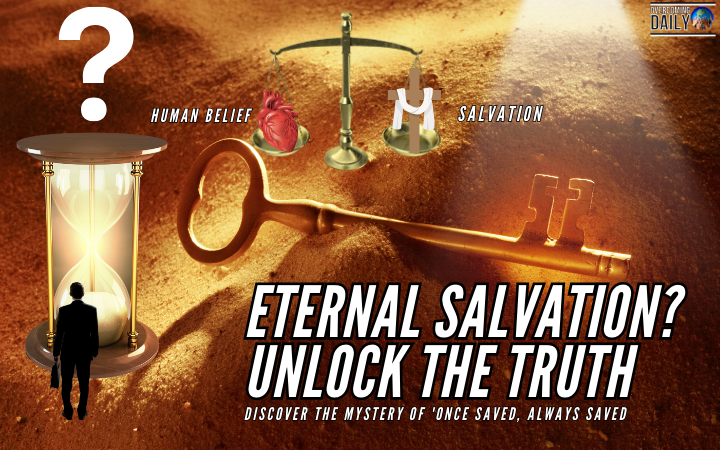
"Does Salvation Last Forever? An In-Depth Look at 'Once Saved, Always Saved'"
Introduction: Understanding Salvation
Christianity teaches the concept of salvation, which is the process through which individuals are saved from sin and granted eternal life in heaven. The phrase "once saved, always saved" is a controversial topic within the Christian community. This article aims to provide a detailed analysis of the concept, taking into account various interpretations and perspectives.
The Biblical Foundation of Eternal Security
Old Testament Verses
The Old Testament contains several passages that suggest the idea of eternal security for believers. For example, in Psalm 37:28, David writes:
"For the Lord loves justice, and he will not abandon his faithful ones. They will be kept safe forever, but the children of the wicked will be destroyed."
Similarly, in Isaiah 54:10, God declares:
"Though the mountains be shaken and the hills be removed, yet my unfailing love for you will not be shaken nor my covenant of peace be removed,” says the Lord, who has compassion on you."
These verses indicate that God's love and commitment to His followers are unshakable, which supports the idea of "once saved, always saved."
New Testament Verses
The New Testament provides even more evidence for eternal security. Some key verses include:
- John 10:27-29: "My sheep listen to my voice; I know them, and they follow me. I give them eternal life, and they shall never perish; no one will snatch them out of my hand. My Father, who has given them to me, is greater than all; no one can snatch them out of my Father’s hand."
- Romans 8:38-39: "For I am convinced that neither death nor life, neither angels nor demons, neither the present nor the future, nor any powers, neither height nor depth, nor anything else in all creation, will be able to separate us from the love of God that is in Christ Jesus our Lord."
- Ephesians 1:13-14: "And you also were included in Christ when you heard the message of truth, the gospel of your salvation. When you believed, you were marked in him with a seal, the promised Holy Spirit, who is a deposit guaranteeing our inheritance until the redemption of those who are God’s possession—to the praise of his glory."
These passages emphasize the eternal nature of salvation and the believer's security in Christ.
Opposing Views on Eternal Security
Conditional Security
Some Christians argue that salvation is conditional, meaning that it can be lost through sin or apostasy. They often cite passages such as Hebrews 6:4-6:
"For it is impossible for those who were once enlightened, and have tasted the heavenly gift, and have become partakers of the Holy Spirit, and have tasted the good word of God and the powers of the age to come, if they fall away, to renew them again to repentance, since they crucify again for themselves the Son of God, and put Him to an open shame."
This verse suggests that those who have experienced salvation can lose it through deliberate, unrepentant sin.
Perseverance of the Saints
Another perspective is the "perseverance of the saints," which holds that true believers will persevere in their faith until the end. Proponents of this view argue that those who fall away were never genuinely saved in the first place. They often cite 1 John 2:19:
"They went out from us, but they did not really belong to us. For if they had belonged to us, they would have remained with us; but their going showed that none of them belonged to us."
Reconciliation of Perspectives
It is essential to recognize that these differing viewpoints stem from a sincere desire to understand and apply the teachings of the Bible. While it may not be possible to reconcile all perspectives, it is important to consider the broader context and themes of Scripture when discussing eternal security.
The Role of Faith and Works
One way to reconcile these perspectives is to acknowledge the importance of both faith and works in the life of a believer. While salvation is a gift from God, it is essential that believers demonstrate their faith through their actions. James 2:14-17 states:
"What good is it, my brothers and sisters, if someone claims to have faith but has no deeds? Can such faith save them? Suppose a brother or a sister is without clothes and daily food. If one of you says to them, 'Go in peace; keep warm and well fed,' but does nothing about their physical needs, what good is it? In the same way, faith by itself, if it is not accompanied by action, is dead."
This passage emphasizes the need for believers to actively live out their faith, which is consistent with both the "perseverance of the saints" view and the conditional security perspective.
The Importance of Spiritual Growth
Another essential aspect of the Christian life is spiritual growth. Believers must continually grow in their relationship with God and strive to become more like Christ. 2 Peter 3:18 urges Christians to:
"Grow in the grace and knowledge of our Lord and Savior Jesus Christ. To him be glory both now and forever! Amen."
This ongoing growth process involves repentance, confession, and transformation. Believers who genuinely seek to grow in their faith will naturally exhibit the qualities associated with eternal security, such as perseverance and good works.
Diagram: The Journey of Salvation
This diagram illustrates the journey of salvation, starting with belief in Christ and leading to eternal security. It highlights the interconnectedness of faith, works, and spiritual growth in the life of a believer.
Conclusion: Embracing the Assurance of Salvation
While the concept of "once saved, always saved" remains a point of debate among Christians, the Bible provides ample evidence for the eternal security of believers. By focusing on the broader themes of Scripture, such as faith, works, and spiritual growth, believers can find assurance in their salvation and be encouraged to live out their faith daily. Ultimately, it is through this ongoing relationship with Christ that Christians can experience the transformative power of God's grace and the promise of eternal life.
Click To Watch "
"5 Characteristics Of Rahab - That Saved Her From Death"
https://www.youtube.com/watch?v=i8thQ9-FALA










Leave a Reply